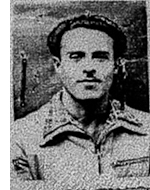Son of Mansano Sta and Massoud. Haim was born on August 11, 1926, in the city of Paz, Morocco, and as a child his family moved to Casablanca, where he spent his youth and his life in 1948. In 1948 Haim was recruited by the Haganah, Overseas recruitment: Young people who were recruited all over the world were trained in Israel for short training and were sent to the front, to the battlefields of the War of Independence, as regular fighters Haim was drafted into the IDF on June 30, 1948, stationed in the infantry and sent to the southern sector. He fought under the command of David Marcus in the battles of the Iraqi police Swiden, Iraq al-Manshiya and the pocket of Falluja. On September 19, 1949, at the end of the War of Independence, he was released. All that time, about a year and two months, his worried family in Morocco did not know what had become of him. Immediately after his release, Chaim returned to Morocco, with the intention of continuing his life from the point where he had stopped, but he did not like the way of life in the Diaspora and decided to return to Eretz Yisrael. On 30 July 1950 he left Casablanca under the assumed name of Eli Suissa. He had to choose a pseudonym so that the Moroccan border police would not discover that it was his second departure from the country’s borders in such a short period of time. From Casablanca he arrived at the port of Marseilles in France, where he volunteered to help bring a ship to Israel. He boarded the ship “Negba” and on the shores of Israel arrived on October 1, 1950. Like most of the immigrants in those days, he entered the country through Sha’ar aliya and from there he was sent directly to the north of the country, to the Rosh Pina transit camp. About a year after his arrival at the Rosh Pina transit camp at the beginning of 1952, Chaim was drafted into the Border Police. He spent the next four years on the border with Syria – Israel, near the Bnot Yaakov Bridge. He was one of the border policemen who manned the “watering station for the waters of the Jordan” on the Israeli side of the Benot Ya’aqov Bridge, in order to maintain Israeli control over the waters of the Jordan and the Sea of Galilee against the repeated attempts of the Syrians to conquer these lands. Remained in his position on the Syrian border for weeks at a time when his wife remained at home in Kiryat Shmona and was treated with two babies, faced with loneliness, fear and child rearing, in the days of almost daily incidents along the Syrian border (which reached the shores of the Sea of Galilee). And was stationed at the Kiryat Shmona station, where he served for about 20 years until his death “The workplace, the station, was our second home, where we spent many days together with the other families of the policemen, some of whom even lived in the police building. My father’s life, my mother and our lives were woven into the tasks of the police, the various shifts, the tasks that were imposed on the police in the city and throughout the country, during the difficult days of the city or the state. Each family plan was coordinated with our father’s work plans. Since we remember ourselves, as children, our father was a man in uniform. He was always careful to carry out his duties faithfully, with dedication and integrity, with the sole purpose of serving the public. His service in the Israel Police was a natural continuation of his astonishing willingness to serve his homeland, to fight for its cause, to help in its establishment and development, and to safeguard that no harm would befall the country and its inhabitants. He demonstrated his love and willingness to contribute to the State of Israel from the moment he fought in the War of Independence as a young soldier, through his service as a guard over the borders of the State and ending his long service with the Israel Police. “On July 20, 1976, He was buried in the Kiryat Shmona cemetery and left a wife and six children.
